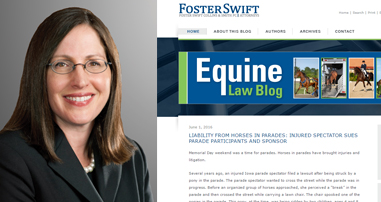

Julie Fershtman, former SBM president and attorney with Foster Swift, writes a blog on equine law. She has been blogging since 2011 and writes about twice a month. She speaks on how blogging has improved her writing style and benefited both her and her firm.
Roberta Gubbins: Why and when did you start the blog?
I’ve had two blogs. One is http://www.sbmpres2012.com, which I kept active while I was the 2011-2012 State Bar of Michigan president, but it’s still available online. This blog was created to share my experiences and travels as the State Bar of Michigan president, and I had a great time preparing it. My other blog is http://www.equinelawblog.com, which I’ve had since 2011, and is intended to educate the equine industry about current legal issues, and I update it about twice a month.
Have your expectations of it changed over time?
Not really. The Equine Law Blog has pretty much accomplished what we’ve set out to do, which was provide information on a wide variety of issues that readers cannot find anywhere else. I’m pretty sure that it’s the largest and most active blog in the world covering equine law issues.
What is your writing process?
For the Equine Law Blog, I’ll brainstorm a list of topics, sometimes months of them at a time. Then, as a topic seems of interest, I’ll write from the list. If I hit a “writer’s block,” then I’ll revisit portions of my equine law books or earlier writings from the many years when I wrote an equine law column. I’ll refresh some of my earlier writings. I’m a huge believer in headings and bullet points, which I think make my articles and blog posts easier to read and better organized. And just about everything I write is edited extensively.
Where do you find topics?
There’s never a shortage of topics, especially where a blog is meant to be broad in scope. My Equine Law Blog covers a wide variety of topics. I’ve written submissions about equipment liabilities, releases, boarding contracts, employment issues, product liability, leases, and so much more.
Think about it; just about everything you see and read about can involve a legal component. The chair you’re seated on probably involved in some way patents, trademarks, labor contracts, employment agreements, advertising agreements, component part purchasing contracts, property leases or purchase documents for the factory, commercial liability insurance, workers compensation, transportation contracts, and antitrust issues. Look around, and the topic ideas will follow.
How do you and your firm benefit from your writing?
Writing has helped me clarify my use of language to become more direct and understandable. This has also made me a better public speaker. Interestingly, public speaking has helped my writings because the great questions I receive during my speaking engagements often generate article topics. My firm benefits from my writings because the firm is mentioned in each biography, and my writings mention the firm and me in a positive way.
Any advice for the lawyer/writer just starting out?
Whether you’re writing or speaking, keep your focus on the audience. If they’re not lawyers then tailor your message accordingly. The point isn’t to impress readers with your intelligence but to help the reader understand certain legal concepts. If you succeed, you’ll develop a following.
- Test out your drafts on non-lawyers whose opinions you trust. Make sure they agree that you’ve covered legal concepts in an understandable way. Be open to criticism.
- Draft an effective biography that accompanies each article you write. Thanks to the internet, your biography can be short since you can direct readers to your personal website. (My personal website, for example, is http://www.fershtmanlaw.com) and my firm’s website (http://www.fosterswift.com). If you practice in a few areas of law, include a few in your biography.
- Don’t expect an immediate response to your writings; you may never receive a response. Instead, derive satisfaction from the fact that you’ve provided an educational service, not from new business. Several years ago, I wrote a detailed article on zoning for a highly regarded industry publication with a large national readership; to my surprise, a potential client brought my article to a lawyer at my husband’s law firm (unaware that my husband practiced there) and instructed the lawyer to “do what she says.” That potential client never did call me. This probably happened many more times of which I’m unaware.
- Share your writings with clients. Consider providing links on your website, business Facebook page, LinkedIn profile, SBM member profile pages, Google+, and more.
- Be strategic as you decide which publications or websites to target your writings. Be ready to change your plan over time.
 Roberta Gubbins has served as the editor of the Ingham County Legal News. Since leaving the paper, she provides services as a ghostwriter editing articles, blogs, and e-blasts for lawyers and law firms. She is the editor of Briefs, the Ingham County Bar Association e-newsletter, and The Mentor, SBM Master Lawyers Section newsletter.
Roberta Gubbins has served as the editor of the Ingham County Legal News. Since leaving the paper, she provides services as a ghostwriter editing articles, blogs, and e-blasts for lawyers and law firms. She is the editor of Briefs, the Ingham County Bar Association e-newsletter, and The Mentor, SBM Master Lawyers Section newsletter.
Read More Clear & Convincing Articles
Using the New Enhanced Member Directory
How to Login and Edit Your Profile
Zeekbeek For Lawyers Page—learn about all the new directory features
How to Contact ZeekBeek Support